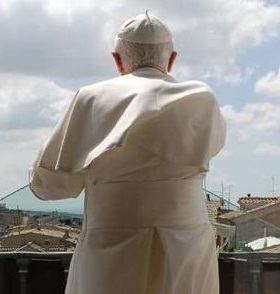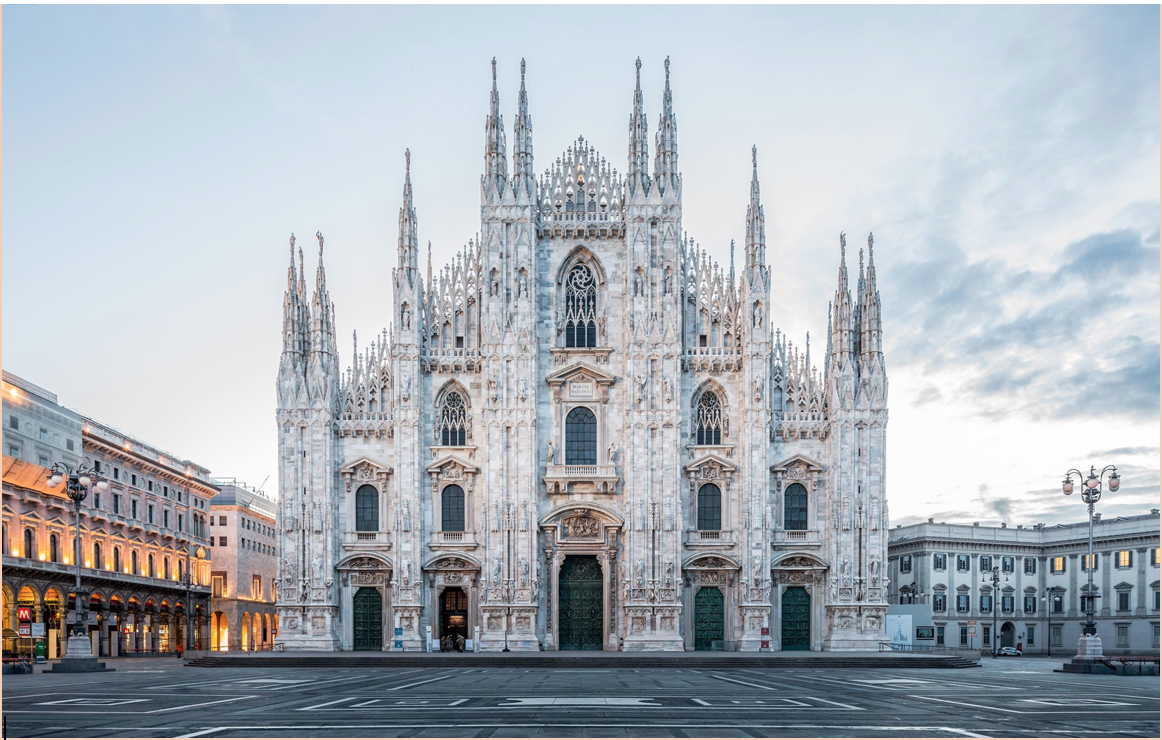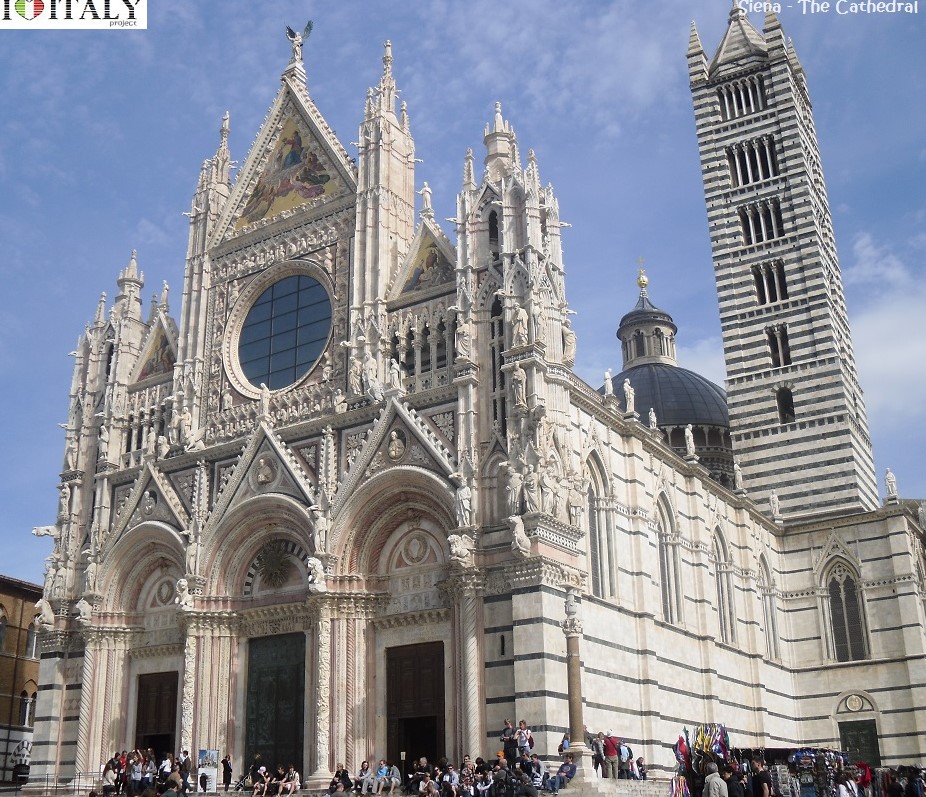



Evangelium Matt 5:13-19
In illo témpore: Dixit Iesus discípulis suis: Vos estis sal terræ. Quod si sal evanúerit, in quo saliétur? Ad níhilum valet ultra, nisi ut mittátur foras, et conculcétur ab homínibus. Vos estis lux mundi. Non potest cívitas abscóndi supra montem pósita. Neque accéndunt lucérnam, et ponunt eam sub módio, sed super candelábrum, ut lúceat ómnibus, qui in domo sunt. Sic lúceat lux vestra coram homínibus, ut videant ópera vestra bona, et gloríficent Patrem vestrum, qui in cœlis est. Nolíte putare, quóniam veni sólvere legem aut prophétas: non veni sólvere, sed adimplére. Amen, quippe dico vobis, donec tránseat cœlum et terra, iota unum aut unus apex non præteríbit a lege, donec ómnia fiant. Qui ergo solvent unum de mandátis istis mínimis, et docúerit sic hómines, mínimus vocábitur in regno cœlórum: qui autem fécerit et docúerit, hic magnus vocábitur in regno cœlórum.
Gospel Matt 5:13-19
At that time Jesus said to His disciples: “You are the salt of the earth; but if the salt loses its strength, what shall it be salted with? It is no longer of any use but to be thrown out and trodden underfoot by men. You are the light of the world. A city set on a mountain cannot be hidden. Neither do men light a lamp and put it under the measure, but upon the lampstand, so as to give light to all in the house. Even so let your light shine before men, in order that they may see your good works and give glory to your Father in heaven. Do not think that I have come to destroy the Law or the Prophets. I have not come to destroy, but to fulfill. For amen I say to you, till heaven and earth pass away, not one jot or one tittle shall be lost from the Law till all things have been accomplished. Therefore whoever does away with one of these least commandments, and so teaches men, shall be called least in the kingdom of heaven; but whoever carries them out and teaches them, he shall be called great in the kingdom of heaven.
E’ molto bello celebrare oggi la festa di S. Bernardo di Chiaravalle, detto “Cantore della Vergine” per la sua predilezione per la BVM. Benedettino, uomo di grande cultura, sapienza e intraprendenza, fondo’ il monastero di Chiaravalle, dando vita all’ordine dei cistercensi.
Ecco le parole di Gesu’ da tenere a mente: «Chi pertanto violerà uno dei minimi di questi comandamenti e insegnerà così agli uomini, sarà tenuto minimo nel regno dei cieli; ma colui che avrà operato ed insegnato, sarà tenuto grande nel regno dei cieli».
Occorre dunque fedelta’ all’insegnamento di Cristo.
San Bernardo fu per questo fine uomo contemplativo e di grande fede, riconosciuto dottore della chiesa, per la sua sapienza, per aver trasmesso l’insegnamento autentico di Cristo.
Nel momento attuale della chiesa il suo esempio e’ illuminante. Occorre infatti far entrare nel nostro cuore e nella nostra mente l’insegnamento di Cristo, dedicandoci con umilta’ e fede – come San Bernardo – alla contemplazione e alla preghiera.
Sia Lodato Gesu Cristo!
It is very nice to celebrate today the feast of St. Bernanrdo of Clairvaux, known as the “Singer of the Virgin” due to his predilection for the BVM.
Benedictine, a man of great culture, wisdom and resourcefulness, founded the monastery of Chiaravalle, giving life to the order of the Cistercians.
Here are the words of Jesus to keep in mind: “Whoever therefore violates one of the least of these commandments and thus teaches men, will be kept minimum in the kingdom of heaven; but he who has worked and taught will be held great in the kingdom of heaven. ”
Therefore, faithfulness to the teaching of Christ is needed. St. Bernard was for this purpose a contemplative man of great faith, recognized as a doctor of the church, for his wisdom, for having transmitted the authentic teaching of Christ. In the present moment of the church, his example is illuminating.
In fact, it is necessary to let the teaching of Christ enter our hearts and minds, dedicating ourselves with humility and faith – like Saint Bernard – to contemplation and prayer.
Praised be Jesus Christ!

Sul blog e’ apparso il seguente documento non firmato.
La domanda che sorge spontanea a questo punto e’ pero’ la seguente: a chi rivolge realmente la sua critica (severa) l’anonimo? Ai semplici fedeli o piuttosto – come e’ del resto ovvio e naturale – alla gerarchia ecclesiastica formata dai consacrati, religiosi, teologi, sacerdoti, vescovi e (naturalmente) cardinali – e piu’ precisamente agli ecclesiastici “che contano” in Vaticano ed anche presso le conferenze episcopali nazionali (particolarmente in Germania, Italia, USA, Francia, Belgio, …).

Evangelium Luc 12:35-40
In illo témpore: Dixit Iesus discípulis suis: Sint lumbi vestri præcíncti, et lucernæ ardéntes in mánibus vestris, et vos símiles homínibus exspectántibus dóminum suum, quando revertátur a núptiis: ut, cum vénerit et pulsáverit, conféstim apériant ei. Beáti servi illi, quos, cum vénerit dóminus, invénerit vigilántes: amen, dico vobis, quod præcínget se, et fáciet illos discúmbere, et tránsiens ministrábit illis. Et si vénerit in secúnda vigília, et si in tértia vigília vénerit, et ita invénerit, beáti sunt servi illi. Hoc autem scitóte, quóniam, si sciret paterfamílias, qua hora fur veníret, vigiláret útique, et non síneret pérfodi domum suam. Et vos estóte paráti, quia, qua hora non putátis, Fílius hóminis véniet.
Gospel Luke 12:35-40
At that time, Jesus said to His disciples, Let your loins be girt about and your lamps burning, and you yourselves like men waiting for their master’s return from the wedding; so that when he comes and knocks, they may straight-way open to him. Blessed are those servants whom the master, on his return, shall find watching. Amen I say to you, he will gird himself, and will make them recline at table, and will come and serve them. And if he comes in the second watch, and if in the third, and finds them so, blessed are those servants! But of this be assured, that if the householder had known at what hour the thief was coming, he would certainly have watched, and not have let his house be broken into. You also must be ready, because at an hour that you do not expect, the Son of Man is coming.
Questa e’ una settimana molto importante.
La nostra meditazione e’ tutta centrata attorno a Maria. Oggi celebriamo il santo che ha promosso per primo i culti al Cuore Immacolato di Maria e del Sacro Cuore di Gesu’. E quindi un precursore delle rivelazioni di Fatima dove la BVM rivelo’ per la prima volta l’importanza del culto del suo Cuore Immacolato nella prospettiva della Provvidenza. Si tratta di San Giovanni d’Eudes (Saint Jean d’Eudes), nativo della Normandia nel 1601 e morto a 79 anni nel 1680.
Fu il primo e più ardente apostolo del culto liturgico ai Sacri Cuori di Maria (1648) e di Gesú (1672), celebrandone per il primo le feste ogni anno e lasciando alla sua congregazione proprio il compito di celebrarle con grande solennità.
Per questo ebbe riconosciuto dal Pontefice Leone XIII il titolo di autore del culto liturgico dei Cuori Sacratissimi di Gesù e di Maria.
Con l’occasione vi rendo noto un importante evento coincidente, ovvero che la nostra cappella e’ proprio dedicata ai sacri cuori di Gesu’ e Maria!
Sia lodato Gesu Cristo!
This is a very important week. Our meditation is all centered around Mary.
Today we celebrate the saint who first promoted the cults to the Immaculate Heart of Mary and the Sacred Heart of Jesus.
It is therefore to be considered a true forerunner of the Fatima revelations, where the Holy Virgin revealed for the first time the importance of the cult of her Immaculate Heart in the prospect of the Providence. It is San Giovanni d’Eudes (Saint Jean d’Eudes), a native of Normandy in 1601 and who died aged 79 in 1680.
He was the first and most ardent apostle of liturgical worship to the Sacred Hearts of Mary (1648) and of Jesus (1672), celebrating their feasts every year for the first and leaving for this purpose to his congregation the tasks of celebrating them with great solemnity. For this he was recognized by Pope Leo XIII with the title of author of the liturgical cult of the Sacred Hearts of Jesus and Mary.
On this occasion, I would like to inform you of an important coincidental event, namely that our chapel is dedicated to the sacred hearts of Jesus and Mary!
Praised be Jesus Christ!


Vangelo Matteo 19:27-29
27Allora Pietro prendendo la parola disse: «Ecco, noi abbiamo lasciato tutto e ti abbiamo seguito; che cosa dunque ne otterremo?». 28E Gesù disse loro: «In verità vi dico: voi che mi avete seguito, nella nuova creazione, quando il Figlio dell’uomo sarà seduto sul trono della sua gloria, siederete anche voi su dodici troni a giudicare le dodici tribù di Israele. 29Chiunque avrà lasciato case, o fratelli, o sorelle, o padre, o madre, o figli, o campi per il mio nome, riceverà cento volte tanto e avrà in eredità la vita eterna.
Gospel Matthew 19: 27-29
Then Peter took the floor and said, “Behold, we have left everything and followed you; what then will we get of it? ». 28 And Jesus said to them, “Truly I tell you, you who have followed me, into the new creation, when the Son of Man sits on the throne of his glory, you too will sit on twelve thrones to judge the twelve tribes of Israel. 29Anyone who has left homes, or brothers, or sisters, or father, or mother, or children, or fields for my name, will receive a hundredfold and inherit eternal life.
I due grandi apostoli Pietro e Paolo compivamo grandi miracoli anche, passando tra i malati sotto il portico di Salomone, anche lasciando soltanto su di essi la loro ombra!
Anche ora i due grandi apostoli possono essere invocati.
Le nostre vite, come l’intera chiesa, sembrano trovarsi infatti in balia delle potenze del male. Tuttavia, secondo la promessa di Gesu’ Cristo, il male non prevarra’ sulla chiesa!
Ma abbiamo la necessita’ di ricorrere all’intercessione di Pietro e Paolo.
Le potenze del male non prevarranno, nemmeno su di noi, grazie all’intercessione di questi due grandi santi! La loro ombra sara’ su di noi!
Sia lodato Gesu Cristo!
The two great apostles Peter and Paul performed great miracles, passing among the sick under Solomon’s porch, even just leaving their shadow over them!
Even now the two great apostles can be invoked.
Our lives, as the whole church, seem in fact at the mercy of the powers of evil. Nevertheless, according to the promise of Jesus Christ, evil will not prevail on the church!
But we need to have recourse to the intercession of Peter and Paul.
The powers of evil will not prevail, neither on us, thanks to the intercession of these two great saints! Their shadow will be on us too!
Praised be Jesus Christ!

Evangelium Luc 12:35-40
In illo témpore: Dixit Iesus discípulis suis: Sint lumbi vestri præcíncti, et lucernæ ardéntes in mánibus vestris, et vos símiles homínibus exspectántibus dóminum suum, quando revertátur a núptiis: ut, cum vénerit et pulsáverit, conféstim apériant ei. Beáti servi illi, quos, cum vénerit dóminus, invénerit vigilántes: amen, dico vobis, quod præcínget se, et fáciet illos discúmbere, et tránsiens ministrábit illis. Et si vénerit in secúnda vigília, et si in tértia vigília vénerit, et ita invénerit, beáti sunt servi illi. Hoc autem scitóte, quóniam, si sciret paterfamílias, qua hora fur veníret, vigiláret útique, et non síneret pérfodi domum suam. Et vos estóte paráti, quia, qua hora non putátis, Fílius hóminis véniet.
Gospel Luke 12:35-40
At that time, Jesus said to His disciples, Let your loins be girt about and your lamps burning, and you yourselves like men waiting for their master’s return from the wedding; so that when he comes and knocks, they may straight-way open to him. Blessed are those servants whom the master, on his return, shall find watching. Amen I say to you, he will gird himself, and will make them recline at table, and will come and serve them. And if he comes in the second watch, and if in the third, and finds them so, blessed are those servants! But of this be assured, that if the householder had known at what hour the thief was coming, he would certainly have watched, and not have let his house be broken into. You also must be ready, because at an hour that you do not expect, the Son of Man is coming.
L’unica cosa certa e’ che il Figlio dell’Uomo viene e vuole trovare i suoi servi pronti, con i fianchi cinti e le lanterne accese.
La sua venuta sara’ all’improvviso quando non sappiamo.
Oggi ricorre la festivita’ di San Giacinto Odrowąż, in polacco Jacek (Kamień Śląski, 1185 – Cracovia, 15 agosto 1257), religioso polacco appartenente all’Ordine dei Frati Predicatori,
Si reco’ in pellegrinaggio a Roma dove incontro’ San Domenico sulla tomba degli apostoli. Inizialmente canonico lascio’ i suoi beni e divenne un ardente missionario dominicano che opero’ nei paesi baltici, in Polonia e in Russia.
San Giacinto si e’ fatto trovare pronto. Infatti e’ morto proprio il giorno dell’assunzione di Maria, per essere glorificato in cielo con i santi. E’ stato proclamato santo da papa Clemente VIII nel 1594.
Sia lodato Gesu’ Cristo!
The only certain thing is that the Son of Man comes and wants to find his servants ready, with girded hips and lit lanterns.
His coming will be suddenly when we don’t know.
Today is the feast of St. Hyacinth Odrowąż, in Polish Jacek (Kamień Śląski, 1185 – Krakow, August 15, 1257), a Polish religious belonging to the Order of Preachers.
He went on pilgrimage to Rome where he met St. Dominic at the tomb of the apostles.
Initially a canon, he left his possessions and became an ardent Dominican missionary working in the Baltic countries, Poland and Russia.
San Giacinto was found ready.
In fact, he died on the day of Mary’s assumption, to be glorified in heaven with the saints. He was proclaimed a saint by Pope Clement VIII in 1594.
Praised be Jesus Christ!



